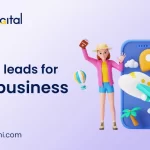
How to Generate Leads for Travel Business | Proven Strategies for Agencies
October 4, 2024
SEO for Real Estate: Attracting Buyers and Sellers with Optimized Listings
October 18, 2024Reading Time: 8 minutes
Table of Contents
- Introduction: Why Lead Generation is the Future of Business Growth
- What is Lead Generation?
- Why Lead Generation is Crucial for Business Success
- The Best Lead Generation Strategies for 2025
- How to Capture & Convert Leads Faster
- Conclusion: Ready to Scale Your Business?
Introduction: Why Lead Generation is the Future of Business Growth
Lead generation is the fuel that drives business success. No leads? No sales. No sales? No business.
Here’s why lead generation is non-negotiable for your business in 2025:
Data-Driven Insights: Businesses that use lead generation analytics grow 2X faster than those that don’t. (Source: McKinsey & Co.) Higher ROI: Companies using a structured lead generation strategy see a 133% increase in revenue. (Source: Marketo) Better Targeting: 74% of marketers say lead quality is their top priority over quantity. (Source: HubSpot)
This ultimate guide will show you how to generate, nurture, and convert leads into paying customers-FAST.
What is Lead Generation?
Lead generation is the process of attracting, engaging, and converting potential customers into buyers.
Types of Leads:
| Lead Type | Description | Example |
|---|---|---|
| Cold Lead | No prior interaction with your business. | Someone who sees your ad but hasn’t engaged yet. |
| Warm Lead | Has shown interest (e.g., visited your website, downloaded an eBook). | A visitor signs up for a free guide. |
| Hot Lead | Ready to buy with minimal persuasion. | A potential customer who requests a free trial. |
The Goal: Move leads through the buyer’s journey-from awareness to decision-making.
Why Lead Generation is Crucial for Business Success
1. Fuels Business Growth
- A steady flow of leads ensures consistent business expansion.
- Lead generation bridges the gap between marketing and sales.
Example: A digital marketing agency optimized its lead gen strategy and saw a 300% increase in high-ticket client acquisitions.
2. Targets High-Intent Customers
- Stop wasting time on uninterested prospects.
- With advanced targeting, lead generation focuses on quality over quantity.
Example: A real estate company used AI-powered lead scoring and improved its conversion rate by 42%.
3. Builds Brand Authority & Trust
- Content-driven lead generation positions your brand as an expert.
- Consistent engagement increases brand recall by 80%.
Pro Tip: Publishing valuable content (blogs, case studies, webinars) boosts trust and drives qualified leads.
4. Increases Sales & Revenue
- More leads = More conversions = Higher profits.
- Businesses that prioritize lead gen see 2X higher sales growth.
Example: A B2B SaaS company added lead magnets (free demos) and increased signups by 67%.
5. Cost-Effective & Scalable
- SEO, content marketing, and email yield long-term ROI at lower costs.
- Inbound leads cost 62% less than outbound leads. (Source: DemandGen)
Example: A startup scaled from 100 to 1,000+ leads per month using organic SEO & content marketing.
The Best Lead Generation Strategies for 2025
SEO (Search Engine Optimization)
✅ Optimize for high-intent keywords.
✅ Use local SEO for better visibility.
✅ Focus on backlinks & content authority.
Example: A law firm ranked #1 for “best lawyers near me” and saw a 72% increase in client inquiries.
✍️ High-Converting Content Marketing
✅ Create SEO blogs, guides & whitepapers.
✅ Use video content (80% of traffic is video-based).
✅ Leverage interactive content (quizzes, calculators, webinars).
Example: A travel company boosted organic traffic by 400% through travel blogs & video storytelling.
Social Media Growth & Ads
✅ Post engaging, shareable content.
✅ Run Facebook & LinkedIn lead gen ads.
✅ Retarget website visitors with custom audiences.
Example: A fashion e-commerce store doubled its sales using Instagram & TikTok ads.
Email Marketing & Lead Nurturing
✅ Use automated lead nurturing sequences.
✅ Personalize emails for higher open & conversion rates.
✅ Offer valuable lead magnets (eBooks, free trials, discounts).
Example: A fitness brand increased revenue by 50% with personalized email campaigns.
PPC Advertising (Google & Social Media)
✅ Run Google Ads for high-intent searches.
✅ Use LinkedIn Ads for B2B lead generation.
✅ Test YouTube & TikTok ads for brand awareness.
Example: A SaaS company generated 500+ demo requests/month using PPC & remarketing ads.
AI & Chatbots for Lead Qualification
✅ Automate lead qualification & FAQs.
✅ Use AI chatbots to capture website visitors.
✅ Implement AI-driven email sequences for follow-ups.
Example: An e-commerce brand used chatbots and increased sales by 35%.
Conclusion: Ready to Scale Your Business?
Lead generation is the key to sustainable growth. By implementing smart, data-driven strategies, you can:
✅ Attract high-quality leads
✅ Increase conversions & revenue
✅ Build long-term customer relationships
Want a Personalized Lead Gen Strategy?
Book a Free Consultation & let’s grow your business together!



